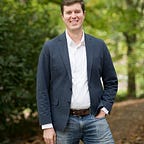Rewilding our cities
In 1970, Canadian music icon Joni Mitchell wrote the song “Big Yellow Taxi” while on a trip to Hawaii. The first morning that she awoke she opened the curtains to her hotel room where she could see beautiful lush green mountains in the distance. However when she looked down she was dismayed that all the eye could see was a parking lot.
It was this experience that compelled her to write the song with the infamous line that has been sung millions of times since then.
“They paved over paradise and put up a parking lot.”
While that may be the catch phrase of the song, Mitchell’s other lyrics are just as poignant and biting.
Took all the trees, put ‘em in a tree museum, charged the people a dollar and a half just to see ‘em.”
This is a reference to Foster Gardens, a place in Waikiki which is a large garden full of tall trees with native and endangered species that is basically a tree museum.
The line, “Put away that DDT now, give me spots on my apples but leave me the birds and the bees” refers to the chemical DDT, which was once hailed as a scientific cure-all from malaria prevention to a powerful insecticide that was sprayed heavily on our crops (which then paved the way for glyphosate, another equally damaging chemical still presently applied to our food.)
If we should learn anything from these lyrics it’s that the paradise Mitchell was referring to is all of our lands, not just tropical Hawaii.
Concrete jungles dominate our landscapes. Once fertile lands are now roads and buildings. Sod and cement have become a cultural expression of the sterile environments we have cultivated over the last century.
Nature is something that we want “out there” — away from our immediate human spaces. We draw boundaries around areas to designate as “natural.” These are our state and national parks, places inaccessible by many, and certainly a far cry from the ecological environments that the land supported over the last millennia.
Rewild our cities
There is a growing movement that seeks to reverse this pattern of urban industrial sterilization by rewilding our cities. This is a concept that should be of particular interest as we search for ways to heal, nourish, and ground ourselves during turbulent and unsettling times.
To rewild a place means to remember what the essence of the place once was, and to honor what it wants to evolve to be.
Our land is meant to catch the rain water that falls from the celestial heavens. It is meant to support a vast myriad of plants and pollinators. The land is alive, and is meant to support life, because it is life.
Action
For us to rewild our cities we must take a look at the ingrained cultural patterns that we have adopted. The easiest place to start is our own lawns and yards.
We are using trillions of gallons of water per year just on home lawn maintenance, and for what? Monocultures of green grass that are useless for food, fodder or shelter.
Furthermore think of all the resources that are wasted due to the constant attention and inputs needed to maintain a lawn. From mow-and-blow landscaping crews to harmful pesticides and herbicides, landscaping is a multi-billion dollar industry.
What would our cities look like if homeowners were to replace the grass with gardens?
Instead of diminishing soil to dirt, we could see it for what it really is — the medium for life.
We could reduce the temperatures of the cities by growing our tree canopies.
We could grow nutritious food out our front doors that would in turn make us healthier while providing invaluable educational opportunities for our children.
We could bring beauty back into our lives while supporting pollinator habitat.
We could change the sounds to that of birds, crickets, and frogs. The sounds that soothe and relax.
We could reduce the heavy infrastructure costs associated with storm water services by putting water back into the landscape where it can percolate back into ground water.
We could increase our air quality and create less toxic environments that erode our health.
The benefits are staggering. Rewilding our cities is really about rewilding ourselves. We must remember what the essence of being alive is truly all about. It’s about living well in conjunction with nature. We are not above nature, but an integral part of it.
For that I say let’s bring nature back into the city and restore the paradise that once was.
